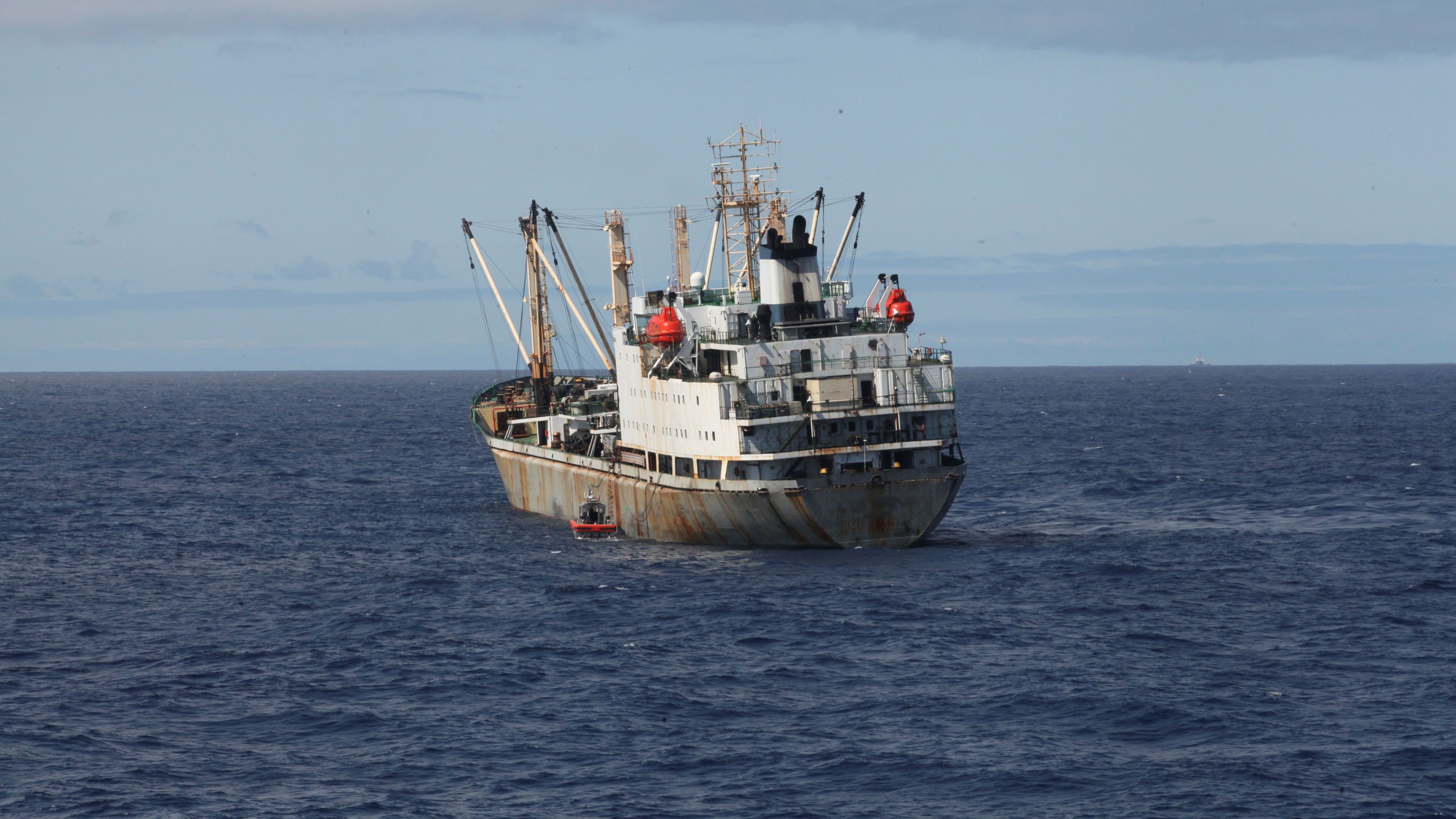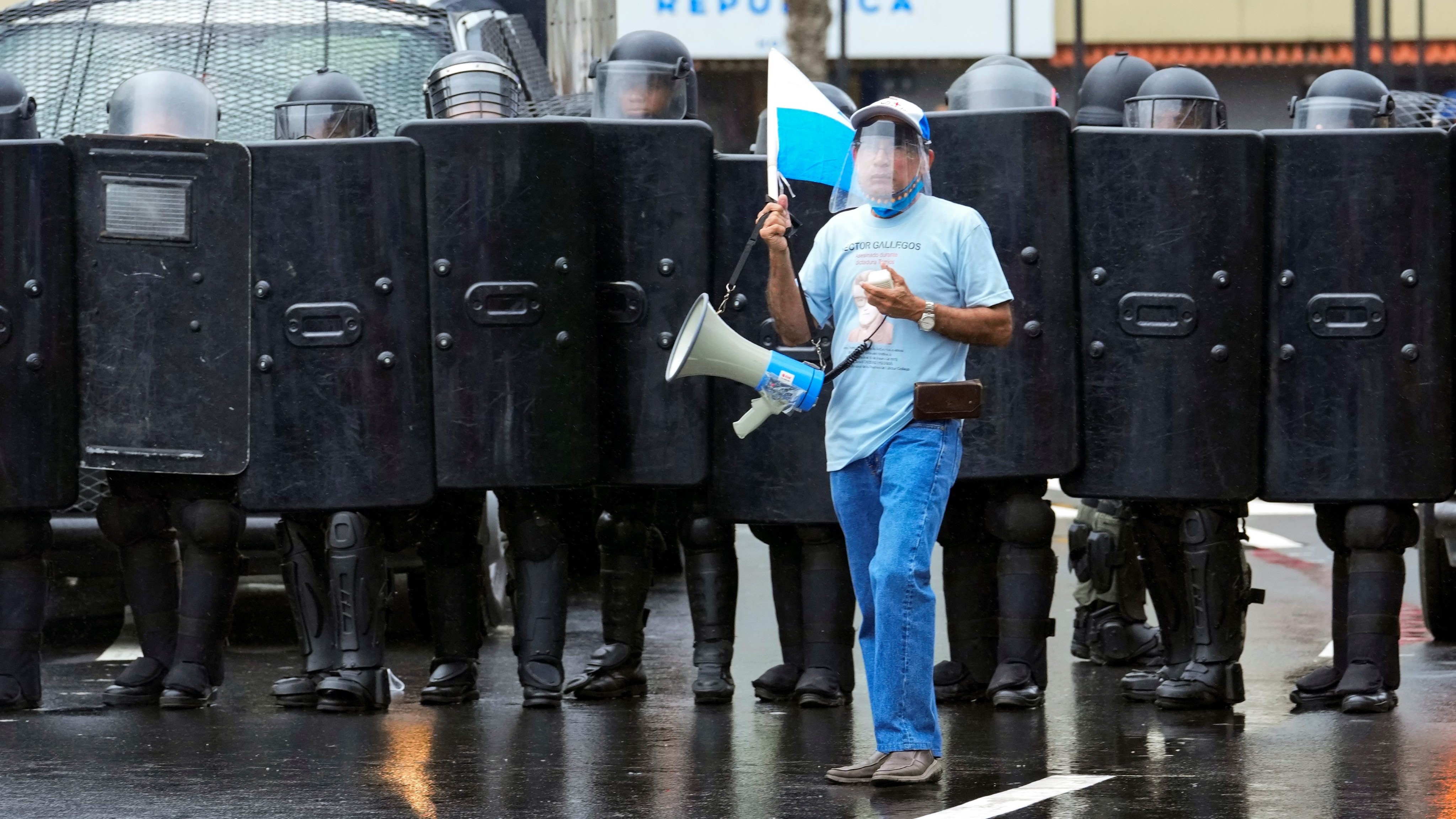
Hello, everyone. Today at WPR, we’re covering the absence of Palestinian voices in the recent push to recognize Palestine and Germany’s resurgent defense industry.
But first, here’s our take on today’s top story:

Guinea’s interim president, then-Col. Mamady Doumbouya, watches over an independence day military parade in Bamako, Mali, Sept. 22, 2022 (AP photo).
Eight coups took place in West and Central Africa between 2020 and 2023, leading the region to be dubbed “the coup belt.” Two developments this week indicate a continuation of this troubling tilt toward autocracy.
The lower house of Chad’s legislature overwhelmingly approved revisions to the country’s constitution that extend presidential terms from 5 to 7 years and remove limits on the president’s time in office. The amendments are expected to also pass the Senate and be signed into law by President Mahamat Idriss Deby, who seized power and set up a military junta in 2021 after the death of his father, Idriss Deby, who ruled the country for more than 30 years.
And in Guinea, a referendum will be held Sunday for a new constitution that would allow junta leader Mamady Doumbouya to run for president despite his pledge to not do so when he seized power in a coup in 2021.
In both Guinea and Chad, human rights groups have documented numerous instances of opposition figures being harassed, assaulted, tortured or forcibly disappeared. All of this has happened amid international indifference. France, traditionally the most influential foreign power in West and Central Africa, never prioritized governance and human rights issues, opting to focus on security concerns like the campaign against extremist militants. More recently, it has been preoccupied with the withdrawal of most of its military forces from the region.
The United States under President Donald Trump, meanwhile, has forgone its traditional focus on promoting political openness overseas, instructing its diplomats to avoid commenting on other countries’ elections. Indeed, it has even shown willingness to engage with repressive military regimes. According to The Washington Post, the Trump administration has increased its intelligence sharing with the junta in Mali, which orchestrated a coup in 2021 and has recently struggled to combat a rising tide of attacks by militant extremist groups associated with al-Qaida and the Islamic State.
West Africa’s primary regional body, the Economic Community of West African States, has expressed concern about the trend toward “unconstitutional changes of government,” but has been ineffective in addressing it. Junta-led governments in Mali, Niger and Burkina Faso have simply withdrawn from the bloc and started their own security partnership known as the Alliance of Sahel States, which has increasingly aligned with Russia.
A critical reason for the success of military coups around the region is the failures of the governments that preceded them, many of which were led by aging and out-of-touch elites trying to cling to power. Poor governance and economic crises have led people in the region to look relatively more favorably upon military rulers’ promises of stability.
There are more troubling signs on the horizon. In Cameroon, for example, 92-year-old President Paul Biya is standing in elections that will be held next month, despite having ruled the country for more than 40 years. While Biya has tried to consolidate control over the military brass, his succession plans are unclear. Mass unrest in the wake of the polls could create an opportunity for the army to step in.
With few brakes on their power, the region’s military strongmen look set to continue consolidating their power. The question is whether they can deliver on promises to address economic crises amid a deteriorating security environment. Prospects so far do not look positive.
Sponsor
Looking for unbiased, fact-based news? Join 1440 today.
Join over 4 million Americans who start their day with 1440 – your daily digest for unbiased, fact-centric news. From politics to sports, we cover it all by analyzing over 100 sources. Our concise, 5-minute read lands in your inbox each morning at no cost. Experience news without the noise; let 1440 help you make up your own mind. Sign up now and invite your friends and family to be part of the informed.

In recent weeks, a number of Western countries have announced their intention to recognize Palestine as a state, including France, Canada, Malta, Belgium and the United Kingdom. Palestine is already recognized as a state by 145 countries, but because the latest push for recognition comes from powerful states, including some permanent members of the U.N. Security Council, the news has been met with a great deal of attention. Yet as Dana El Kurd points out, the recent push for recognition fails to consider what the Palestinian people want or even what they would accept.
Germany’s sizeable arms industry has long been the country’s dirty little secret. Owing to historical sensitivities, Germans joked that the state’s relationship with its defense contractors was Schmuddelkinder, meaning “street urchins to be avoided.” This is now changing in the context of the war in Ukraine, as the country’s major defense companies undergo substantial transformations. Yet challenges abound, not only for Germany’s defense industry, but also for its state capacity, WPR columnist Ulrike Franke writes.

A new report says that Chinese squid-fishing boats operating in the waters off South America, which supply some of the calamari consumed by U.S. and European diners, are depleting the marine ecosystem and abusing workers. The report by the London-based Environmental Justice Foundation says the squid population in the unregulated waters of the Southwest Atlantic is showing worrying signs of decline and the fleet’s mostly Indonesian and Philippino crew members are “in a postion of extreme vulnerability.”
Steve Trent, the CEO and founder of the Environmental Justice Foundation, penned a WPR briefing in May on Chinese fishing operations around the world. “China’s distant-water fishing fleet, the world’s largest, is engaging in human rights abuses and systematic illegal fishing on an unprecedented scale,” he wrote.
Tens of thousands of people in Ecuador took to the streets to protest a planned gold mine in the country’s Azuay province, saying it will negatively affect the supply of drinking water in the area of the new mine. Dundee Precious Metals, a Canadian multinational, was granted a license to build the mine by the government of President Daniel Noboa.
Ecuador isn’t the only country in Latin America that is experiencing a public backlash against mining in the current period of high commodity demand, especially for those critical minerals used in electrification and the renewable energy transition. Panama, Chile and Peru have also experienced significant demonstrations against mining projects in recent years. “There is no way out of this commodities trap without heeding protesters’ demands that citizens and communities benefit from the proceeds of mining, and the recent wave of social and political mobilization against mining makes it clear that what is being done right now is not enough,” James Bosworth wrote in a November 2023 WPR column.
A year ago today, thousands of pagers carried by members of Hezbollah in Lebanon exploded, the result of a complex sabotage operation by Israeli intelligence. The victims of those attacks, many of them innocent, are still recovering, Reuters reports. In addition to violating prohibitions against targeting civilians, the nature of the attacks likely violated laws of war designed to limit suffering and superfluous injury, Charli Carpenter wrote in WPR in the immediate wake of the attacks.
Latin America once again ranked as the most dangerous region in the world for environmental activists, as more than 80 percent of the nearly 150 people killed or disappeared last year for defending land or resources resided in the region, according to a new report from Global Witness. In one of his last pieces for WPR, published in September 2024, the late Robert Looney looked at the impact of such targeted killings on Honduras' efforts to stop deforestation.
More from WPR
Benjamin Gedan and Jana Nelson on the challenges facing oil-rich Guyana after President Irfaan Ali’s reelection.
Mary Gallagher on the case for U.S. strategic ambiguity over Taiwan.
Josh Kurlantzick and Annabel Richter on China’s rising arms exports.
James Bosworth on why Argentina’s voters are running out of patience with Milei.
Read all of our latest coverage here.






